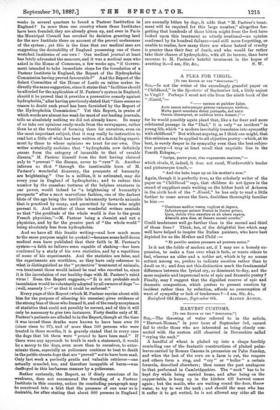A PLEA FOR VIRGIL.
[To TOM EDITOR or THE SPECTATOR."]
Ssa,ŌĆöIs not the writer of the exceedingly graceful paper on "Childhood," in the Spectator of September 3rd, a little unjust to Virgil P Perhaps I must not cite from the ninth book of the "./Eneid,"ŌĆö
" ŌĆö necnon et pnlcher Inks,
Ante anises animunsque gerens cnramque Malta patri mandate dabat portends, sad aline Omnia discerpuut, et nubibus irrita donant ;"ŌĆö
for he would possibly again plead that, like a far finer and more celebrated passage in the "Iliad," it is only " an incident" in young life, which " a modern inevitably translates into sympathy with childhood." Bat without arguing, as I think one might, that this criticism may be applied to all objective poetryŌĆöwhich, at its best, is surely deeper in its sympathy even than the best subjec- tive poetryŌĆöI may at least recall that exquisite line in the Fourth Eclogue,ŌĆö " Incipe, parve pier, thin cognoseere matrem,"ŌĆö
which rivals, if, indeed, it does not excel, Wordsworth's tender and picturesque touch,ŌĆö
" And the babe leaps up on his mother's arm."
Again, though it is perfectly true, as the scholarly writer of the paper on "Childhood" says, that children do not figure in the crowd of suppliant souls waiting on the hither bank of Acheron in the sixth book of the " Amid," he has only to read a little further to come across the lines, doubtless thoroughly familiar to him :ŌĆö
" Continue audits melee, vagitae et ingens,
Infautumque anima fleeter in limine prime, Quos, duicis vitas exsortee et at nbere mites,
Abetulit atra dies, et fuoere mersit acerbo." Could tenderness well go further than in the second and third. of those lines P Think, too, of the delightful line which may well have helped to inspire the Italian painters, who have best depicted for us the Mother and Child :- " Et pavidas metres premiere ad pectora natos."
Is it not the foible of modern art, if I may use a homely ex- pression, to make a fuss over what it feels, or wants others to feel, whereas an older and a nobler art, which is by no means extinct among us, prefers to indicate emotion rather than to dwell on it ; and does not this distinction mark the fundamental difference between the lyrical cry, so dominant to-day, and the more majestic and impersonal note of epic and dramatic poetryf Finally, may I suggest that the dignified reserve of epic and dramatic composition, which prefers to present emotion by incident rather than by reflection, affords no presumption of want of sympathy or lack of tenderness ens, Sir, &c., Stanford Old Manor, September 6th. ALFRED AUSTIN.


































 Previous page
Previous page